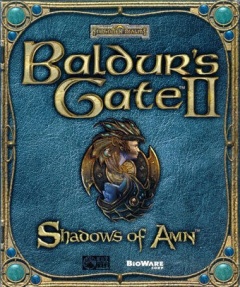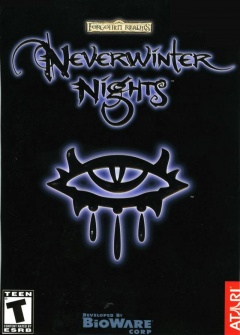The Board Game that Changed the World
 What comes to your mind when I say "Dungeons and Dragons?"
Twenty-sided dice? 2d6? Attack of opportunity? Fortitude save? Gary
Gygax? Figurines? Yes, these all come to mind to those who have never
even played the board game that changed the world.
What comes to your mind when I say "Dungeons and Dragons?"
Twenty-sided dice? 2d6? Attack of opportunity? Fortitude save? Gary
Gygax? Figurines? Yes, these all come to mind to those who have never
even played the board game that changed the world.
You might be wondering why, on a video game review site, I am writing about Dungeons and Dragons. Well, to many gamers, it is a bit more obvious. "I've played Star Wars: Knights of the Old Republic, I know about dungeons and dragons!" and that is true, you do.
What I am afraid people don't understand is that while Bioware has certainly helped establish Dungeons and Dragons rules into video games, it goes much farther than that.
You can thank Gary Gygax and Dave Arneson for what is basically the first role playing game. Being as such, it has spawned so much in such a short time it is amazing. What I mean by that is that games that have any sort of turn based game with stats that effect chances to be successful in whatever you may be doing has roots in Dungeons and Dragons.
To show you what I mean, I'll list simply a few games that fit into this category: Final Fantasy, Chrono Trigger, Ogre Battle, Fire Emblem, Breath of Fire, Wild Arms and Arc the Lad. All of these games, at their very core, are spawn of Dungeons and Dragons.
 The influence of Dungeons and Dragons is more evident in some games than others. Bioware is especially famous for its use of DND in its games, such as Baldur's Gate, Icewind Dale, Neverwinter Nights and Star Wars: Knights of the Old Republic. These games literally use almost everything from one version of Dungeons and Dragons or another.
The influence of Dungeons and Dragons is more evident in some games than others. Bioware is especially famous for its use of DND in its games, such as Baldur's Gate, Icewind Dale, Neverwinter Nights and Star Wars: Knights of the Old Republic. These games literally use almost everything from one version of Dungeons and Dragons or another.
The reason I am elaborating is that this is a game that is so influential, and yet many of my gamer friends who have not participated in a game of DND often scoff at me or say that is for nerds, but don't really understand what makes this board game so immersive.
Imagine a game where you are not restricted by anything. Imagine a game where your environment is completely destructible. When, if you get in a fight unarmed, you can pick up a bar stool and use that as your weapon, or a mug, or grapple your opponent to the ground. Such a game exists, and it is the game I am talking about.
Dungeons and Dragons has had such an influence on games because it is the ultimate game in so many ways it is unfathomable. The ability to fool people and make them believe false things, such as in the game The Elder Scrolls IV: Oblvion? Dungeons and Dragons has several skills you can afford yourself, such as diplomacy, speechcraft and intimidation that can manipulate would be enemies into stepping aside or even joining your cause.
You can do things you never thought possible. When you fall into a pit and wish your character would climb out because it looks like there are plenty of things to climb with, you can. When you want to raid a caravan passing by to get some spare loot, you can. When you want to become the avatar of the dark god of the devils, Asmodeus, you can. It is all in your mind, and while it has no graphics, it has all the graphics it needs.
 "What about what makes other RPGs so glorious? What about an incredible story?" Well, you write the story!
"What about what makes other RPGs so glorious? What about an incredible story?" Well, you write the story!
"What about the limits of other games? Surely you can't pass those mountains like in Fallout 3!" Oh, but you can! If you can justify it, you can do whatever you want. The results lie in the dice so many of us DNDers so desperately grasp.
But seriously, what is the point of all this? Why am I droning on so aimlessly about a game that was invented in 1974 by guys who are older than the oldest writer on this site? Well, the answer is simple.
We, as gamers, need to completely understand where our roots come from. I've made it a point to try and experience every bit of gaming history that I can. I've played on a pong arcade machine from way back, and I still stop by arcades when I get the chance. They are very rare, now, but it is so important to understand how far we have come.
Many of us talk about the good old days, when we were playing The Legend of Zelda on the NES, and how obsessed we were. But what about the good ol' days that we were not around for?
According to a recent article on CNN, there have been at least 24 million people who have played Dungeons and Dragons. Isn't that just insane? World of Warcraft, which is famously the most subscribed to and played game of all time, doesn't even come close to that, in fact, there are currently 11.5 million subscribers.
Dungeons and Dragons are in so many games that you play, that I desperately urge you to take a roll of the die just once. Buy the three books. The most recent version is version 4.0, and all you really need is the Player's Handbook, the Monster Manual and the Dungeon Master's Guide to get going. It will cost about $100-$120, if you don't have any way to borrow the books.
If you are any kind of dedicated gamer, which I am assuming you are if you are reading this, try it. You will probably be surprised at how amazingly in depth it is, and it really is not that hard to play, and once you do you'll see what I mean by influencing just about every RPG ever created. Ever.
